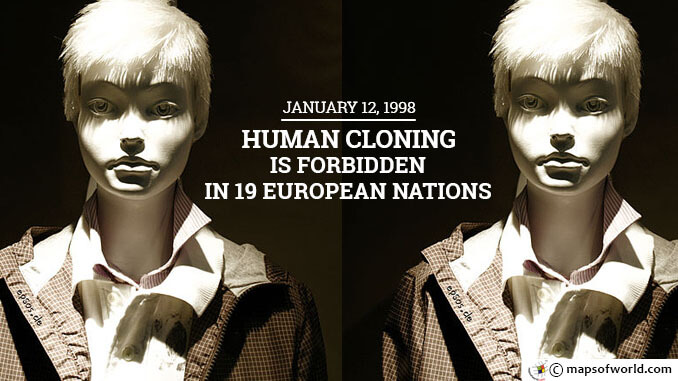On January 12, 1998, a few hours after the President of France, Jacques Chirac, called for a global prohibition of human cloning, some 19 European nations signed an agreement banning any research and work involving genetic replication of human beings. The countries that signed the treaty banning human cloning were Denmark, Estonia, Finland, France, Greece, Iceland, Italy, Latvia, Luxembourg, Moldova, Norway, Portugal, Romania, San Marino, Slovenia, Spain, Sweden, Macedonia, and Turkey. Preceding the ban, French President Chirac had addressed a conference of national ethics committees from a number of European nations and had insisted that the ban needs to be a worldwide one “Nothing will be resolved by banning certain practices in one country if scientists and doctors can simply work on them elsewhere.” Earlier that month, an incident in the US had caught worldwide attention. President Clinton had chastised a Chicago scientist who had announced his intention to work on human cloning. President Clinton had called the agenda “untested and unsafe and morally unacceptable” The US Congress was also considering working on a bill to outlaw human cloning. Interest in cloning dates back to the late 19th century. Herbert Webber of the US Department of Agriculture coined the word “clone” in the year 1903. In 1928, Hans Spemann, the German Nobel laureate, performed the earliest experiment using the nuclear transfer technique on salamander embryos. In 1953, northern leopard tadpoles were cloned using this technique by Robert Briggs and Thomas J King. The most famous animal to be cloned, however, was Dolly the sheep – the first mammal to be cloned from an adult somatic cell. Dolly was produced from experiments at the Roslin Institute, Scotland. The presentation of Dolly in July 1997 set off a global outcry over the implications and ethics of cloning in humans. The American Medical Association defines ‘Human cloning’ as the application of somatic nuclear transfer technology to the creation of a human being that shares all of its nuclear genes with the person donating the implanted nucleus. In January 1998, Chicago-based scientist Richard Seed had announced his intentions to embark on human cloning using a new, untested technology. Seed, a Harvard University educated scientist, had detailed out a plan to set up a human cloning clinic that would produce 200,000 human clones each year and would take about 18 months to produce each human clone. Seed’s announcement attracted staunch criticism from the leaders of many nations worldwide. President Clinton himself called for a 10-year ban on human cloning experiments following fears that the ethics of cloning may test the limits of scientific moral grounds. Addressing the European national ethics committee President Chirac said, “It is on the international level that one must ban cloning and the genetic manipulation susceptible to altering the character of the human species”. Nineteen member nations from the Council of Europe responded to this call and their representatives signed the protocol. According to the accord, these nations would craft laws and legislations to prohibit “any intervention seeking to create human beings genetically identical to another human being, whether living or dead.” The ban ruled out all exceptions – including cloning in case of a completely sterile couple. The Council of Europe was established in 1949 to uphold human rights and democracy. With over 47 member nations and 800 million citizens, the Council has been instrumental in setting legal standards across its members. Two nations were conspicuous by their absence in the signatory list of the cloning protocol Two of Europe’s biggest nations – Germany and the UK – abstained from signing the protocol. Germany claimed that German laws prohibiting cloning and genetic engineering on human embryos were far more robust than the protocol. These were devised as safeguards against any incidences similar to the Nazi experiments on human embryos. The debate for and against human cloning was at the time a raging issue in the UK, with many leading scientists of the opinion that such a ban would restrict scientific freedoms and kill innovation. According to Article 11 of the UNESCO’s Universal Declaration on the Human Genome and Human Rights reproductive cloning of human beings is a deep violation of human rights and dignity. In the US, there is no federal law banning human cloning but about 13 of the 50 states have adopted laws that prohibit reproductive cloning. You may also like : January 12 1863 – Philosopher and Hindu Monk Swami Vivekananda was Born in Kolkata
January 12 1998 – Human Cloning Is Forbidden In 19 European Nations
On January 12, 1998, a few hours after the President of France, Jacques Chirac, called for a global prohibition of human cloning, some 19 European nations signed an agreement banning…
592
